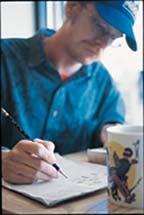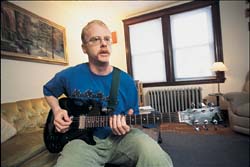 |
 |
| current issue |  |
past issues |  |
send a letter/news |  |
address update |  |
advertise |  |
about us |  |
alumni home |
Features
Still PuzzledPage 2 of 2
Quigley, in turn, calls Shortz "the master, the mentor; who better to learn from?" Though the Times pays less than other publications ($350 for a Sunday puzzle and $100 for a daily, which can take five hours to construct), Quigley still sells Shortz as many puzzles as he can. The Times, after all, is not just the credential with clout but the place that gave him his first break.In the spring of 1996, a month before Quigley graduated from UNH, Shortz bought his first BEQ--in fact, the first puzzle Quigley had dared to send anywhere.
Shortz recalls enjoying the puzzle's theme of familiar phrases ending in dog's names: RANGE ROVER. X MARKS THE SPOT. OEDIPUS REX. The "non-theme" entries included ZIMA ("Coors drink advertised as 'zomething different'"), which clued Shortz that the constructor was young.
 Photo by Perry Smith
Photo by Perry Smith
|
Quigley credits that first sale to dumb luck. Always "a puzzle thinker," he remembers drawing elaborate mazes in grade school when other boys were drawing tanks and guns, but he didn't get hooked on crosswords until college, when a summer "slacker job" photocopying documents left him desperate for distraction. By fall, his parents were mailing him a pile of Times crosswords every week and he was using a book to study construction strategy.
The key to lively puzzles, Quigley says, is "taking a step back to look at the world in a weird way." For him, the offbeat outlook comes naturally. His memories of UNH center on performing with the improv troupe TheatreSports and running a 1995 campaign for student body president that he describes as "a post-humor parody of the whole situation." His ticket's motto: "We make the other candidates look legit."
The way Quigley sees it, he's tried legit and transcended it. After getting laid off from three consecutive jobs in publishing--his final job, as a fact checker, ended two years ago when the magazine folded--he decided to dump the regular-paycheck concept and pledge himself to what had been his part-time passions: puzzles and music. "Both are all math and all relationships; they're about arrangement and how things work together," he says. "They're a collage of disparate elements that combine to..." He stops and laughs. "Does this sound too NPR?"
By day he edits crossword puzzle books and constructs puzzles--sometimes at a frenzied pace, now that paying the rent depends on it. By night he practices or plays gigs with his band, Hip Tanaka, a version of Theatre Sports set to music. On any given night, band members might raffle off shampoo, perform wearing backpacks or studiously ignore the guy grilling hamburgers onstage and distributing them to the audience.
"I love music," he says, "but it would be deranged to expect to make a living at it. C'mon, we're pushing 30, and rock is just not popular."
So he sets himself more obscure challenges: Squeezing as many rock-band names as possible into mainstream puzzles (he's especially proud of WEEZER and BAHA MEN). Trying to be first to incorporate pop-culture references (he missed Monica Lewinsky and Harry Potter but beat the field to NAPSTER and PC CLONE). Aiming for a record: fewest black squares in a puzzle, or most stacked 15-letter words or fewest entries in a 15-by-15 grid (the record low is 54 words; Quigley's best is 64).
 Photo by Perry Smith
Photo by Perry Smith
|
Within the devoted constellation of cruciverbalists (crossword enthusiasts), such things matter. And in that constellation, Quigley is an established star. He dresses casually and lives simply yet he maintains his green scrapbook like a shrine. Each published puzzle is mounted with precise symmetry on a spotless white page sealed in pristine plastic. Any lint or crumb that dares defile the arrangement is instantly whisked away.
Constructing puzzles is, he acknowledges, a bit of an odd way to make a living. But not that odd. "All my friends are creative. They say, 'This is a painting I did, or a poem or a play I wrote.' Well, these are what I do," he says, turning scrapbook pages. Point to any puzzle, any individual clue, and he can narrate with specificity where the idea came from. He's doing this in the cafe when, with a curse, the guy at the next table knocks over a huge cup of coffee.
"This is my life's work," Quigley says, inching his chair away. "It's the only thing people will fight over when I die." And he curves himself around the scrapbook, shielding it from flying liquids and the indignities of the workaday world. ~
Jane Harrigan, a professor of journalism at UNH, is a former managing editor of the Concord Monitor and the author of two books, Read All About It and The Editorial Eye.
Page: < Prev 1 2Easy to print version
blog comments powered by Disqus

